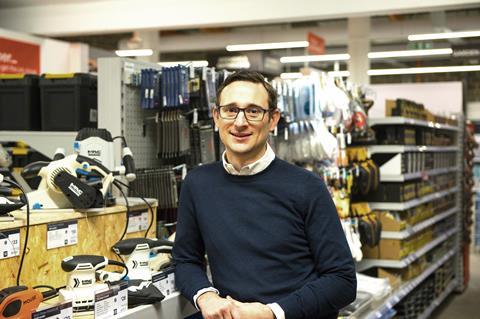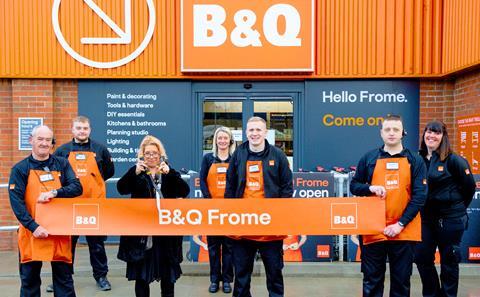Big box DIY giant B&Q is starting to think small. The chain has historically been known for its large out-of-town units offering a wide range of home improvement products – from tins of paint through to house plants.

However, the way people shop is changing, and the Kingfisher-owned chain is rolling out smaller stores in a bid to cater to shifting consumer shopping patterns.
Property Week attended the opening of B&Q’s latest smaller-format store in Frome, Somerset, to catch up with the group’s business development director Chris Bargate and find out the rationale behind the small-store concept and how big a part he thinks it will play in the chain’s future.
Why is B&Q opening smaller DIY stores in town centres?
B&Q’s ecommerce growth strategy has stores at its heart to help give customers easier access to a wider range of products than is stocked at their local store. New smaller stores, in new locations, are a key business priority, enabling B&Q to get closer to customers and to adapt to changing consumer demand.
From our perspective, there are probably two angles. The first is as a customer. We know that convenience is becoming more and more important for customers in retail. And a big part of convenience is accessibility.
I think the second element is accessibility to the range – around 2,000 - 8,000 products in every smaller store.
By putting stores at its heart, B&Q now fulfils over 80% of online orders
One of the things we’re working really hard on is making sure that even if the range in these stores is smaller, customers have got access to the full range via click & collect or delivery. We have the full range of 40,000 products on screens in the store, where people can order from if they can’t get everything they need inside.
What is the property angle to this?
Clearly in urban areas, particularly London, we know that big stores are going to be harder to come by. So, we’re coming up with formats that give us opportunities to get into markets that previously we wouldn’t have been able to access.
What difference are the stores making to the business?
By putting stores at its heart, B&Q now fulfils over 80% of online orders – up from 60% pre the pandemic – both through click & collect at all stores and by using more than 50 larger stores as central hubs for home delivery fulfilment to over 99% of the UK. Through home delivery and click & collect, customers now have access to 40,000-plus lines.
Why open the smaller-format store now?
To help make B&Q more convenient to more customers, we’re trialling small-format stores in a number of different locations like high streets, retail parks and we also have concessions in eight Asda stores.

Alongside opening more smaller stores, we continue to open larger stores, like the recent one in Colchester, and to right-size larger stores, often working with landlords to support their plans.
Why choose Frome in Somerset for the latest store?
The new B&Q Frome store is the first small-format store to open in England outside the South East and will offer a wide range of home improvement products. It gets us in the heart of the community and, being right next to the town’s train station, it’s ideally placed for passing trade as well as those who want the convenience of a local store to buy or order products from.
How big is the Frome store and what does it offer?
Our smaller stores range from between 250 - 2000 sq ft. We’re currently trialling new service formats including kitchen and bedroom design and garden centres. But as a business, we always keep our retail space under review to ensure that we have the best possible solution to meet the needs of our customers while ensuring we are fit to face future retail markets and maximise profitability.
How did you choose the 2,000 - 8,000 item range?
We’ve got a big paint section, and customers can get any colour they want mixed for them in store. There are the kitchen and bathroom planning section and gardening and tooling areas. There’s also a department for tradespeople, with a number of construction products for people working locally to pop in and get what they need. But, of course, they can order anything they want from our complete range of products in store to be collected or delivered.
What sort of towns are you targeting for the smaller-format stores?
I think there’s a combination, and certainly the way we’re testing things, a combination of urban, town high streets and then retail parks, and that’s primarily focused in London at the moment. And there’s potential for us to look in other urban locations further into the testing process.
For us it’s about giving people easy access to products wherever they are
We haven’t made any commitments, but we’d be thinking about how the smaller stores could translate to other markets and then outside urban locations – smaller towns that maybe don’t have easy access to an existing B&Q format.
The stores don’t have to be next to a train station. We’re very open-minded about expansion opportunities at the moment. So, I think the message that we want to put out there is that if people or landlords have got opportunities, come and talk to us.
How do the new stores fit into a post-Covid world?
Multi-channel is becoming super important post Covid – having a strong digital offer that allows customers to shop from home and then a strong physical offer that allows customers to access your range more easily.
We’ve very much put stores at the centre of our digital strategy.
But haven’t we all been warned for years that the high street is dead?
As I said, convenience is of huge importance to customers. The stores are busy, and for us it’s about giving people easy access to products wherever they are. If they’re thinking of some weekend DIY, they can pop into a store in their lunch breaks and get what they need.
Also, we saw the trend during the lockdowns that people are doing more home improvement, and that trend is continuing as we come out of the pandemic.






























No comments yet